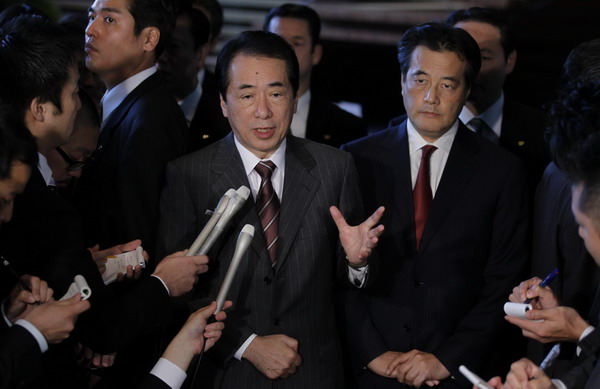Asia-Pacific
Japan party feud distracts from policy challenges
(Agencies)
Updated: 2010-12-23 10:59
 |
Large Medium Small |
|
 Japan's Prime Minister Naoto Kan (C) speaks to the media with his ruling Democratic Party Secretary General Katsuya Okada (R) after meeting with the party powerbroker Ichiro Ozawa at the premier's official residence in Tokyo Dec 20, 2010. Kan said on Monday that party powerbroker Ozawa rejected a call to appear at a parliamentary ethics panel over a funding scandal, threatening to widen a rift in the fractious ruling party. [Photo/Agencies]
|
| ||||
Below are some questions and answers about the feud and its impact on policies.
Why is Kan pressuring Ozawa now?
Kan and his close aides appear to think that facing off with Ozawa will help boost government support rates and improve Kan's chances of keeping his job. Ozawa, 68, is a veteran political mastermind who some credit with engineering the party's rise to power last year, but is plagued by an image as an old-style fixer.
The tactic has worked before, such as after Kan beat Ozawa in a September party leadership race, but may be less effective now.
"It's not that easy," said Keio University professor Yasunori Sone. "There are lots of other problems."
Ousting Ozawa and his backers might, however, make it somewhat easier to unify the often fractious party and could possibly help gain some opposition support to pass laws in the divided parliament, where opposition parties control the upper house and can block bills other than the budget and treaties.
Will Ozawa leave or be booted out of the DPJ?
Ozawa's departure, either voluntarily or through an eventual decision by party executives to expel him, cannot be ruled out.
A January 1 deadline is looming if Ozawa and his DPJ backers want any new party they set up to receive state campaign funds, but analysts were wary of predicting a move before year-end.
While Ozawa heads the biggest group in the party, many of his backers may be reluctant to leave with him, since he is set to be charged, probably early next year, over suspected misreporting by his political funds body.
That means Ozawa is unlikely to take enough MPs along to deprive the DPJ of its majority in parliament's lower house and clear the way for a no-confidence motion to be adopted, although it could further weaken the DPJ in the upper house.
Kan may try to kick Ozawa out, but might wait until after Ozawa is formally charged. Even so, the premier might have trouble getting enough support to take that step, given that Ozawa could well clear his name in court later, analysts said.
Would ousting Ozawa solve Kan's problems?
Hardly. While removing Ozawa might help clear the way for cooperation on passing bills with the second-biggest opposition party, the New Komeito, that outcome is far from assured.
Besides, the biggest opposition party, the Liberal Democrats, are threatening to boycott debate when a regular session of parliament opens in January, unless Chief Cabinet Secretary Yoshito Senkoku and Transport Minister Sumio Mabuchi resign. The upper house adopted non-binding censure motions against the two last month over their handling of a territorial row with China.
Technically, much parliamentary business could go ahead anyway. But the fuss could delay parliament's opening while DPJ leaders try to sort things out, possibly pushing back passage of the budget for the year from April 1 and endangering other legislation including bills to implement spending and taxation.
"The biggest issue is how to manage the upper house and how to get the New Komeito on board, but they aren't skilled at this. They (the DPJ) are amateurs," Sone said.
Critics also say Kan has failed to show the policy direction in which he wants to lead the country, a lack that ousting Ozawa would do little to solve.
Will Kan quit?
Maybe but probably not yet. Pressure to quit will rise ahead of nationwide local elections in April if Kan's ratings are still in the tank, and grow further if the party suffers a thrashing.
But Kan, 64, is already Japan's fifth premier since Junichiro Koizumi ended a rare five-year term in 2006 and voters are tired of seeing leaders throw in the towel when things get tough.
Nor is it clear that any of the possible successors would do a better job, while another change at the top would spell policy confusion while a new government sorted out its priorities.
Some analysts say Kan might call a snap poll for the lower house if key legislation is blocked. But no vote need be held until 2013 and others question whether the prime minister would risk losing control of the powerful lower house.
No party has a majority in the upper house, so the problem of the divided parliament could remain no matter who won.

